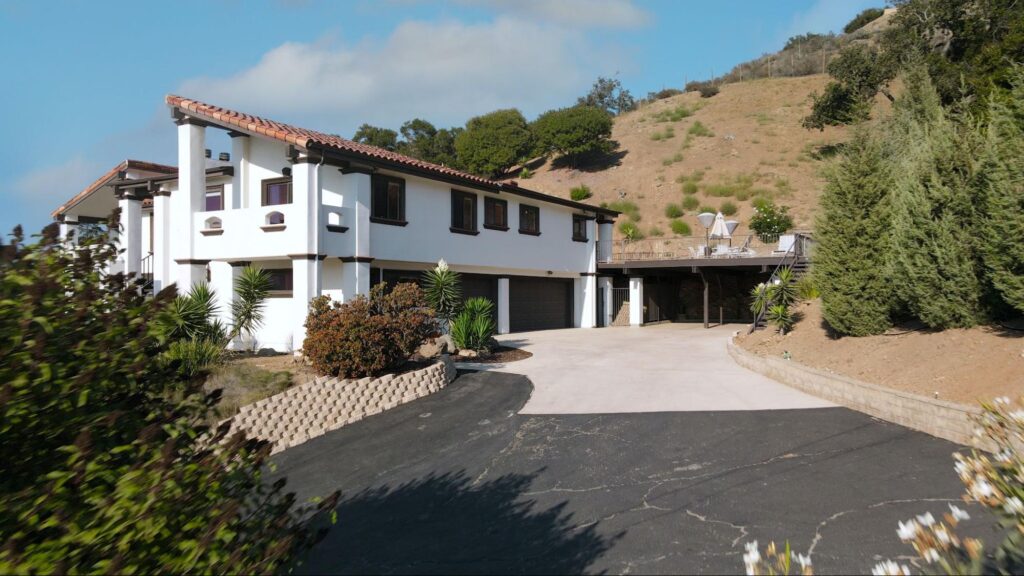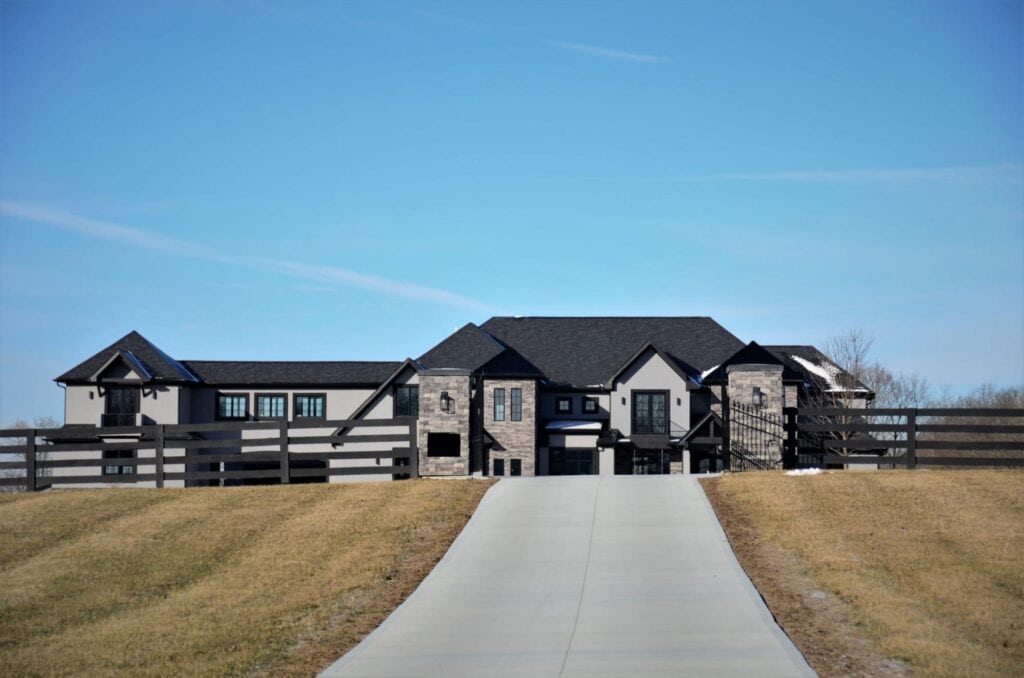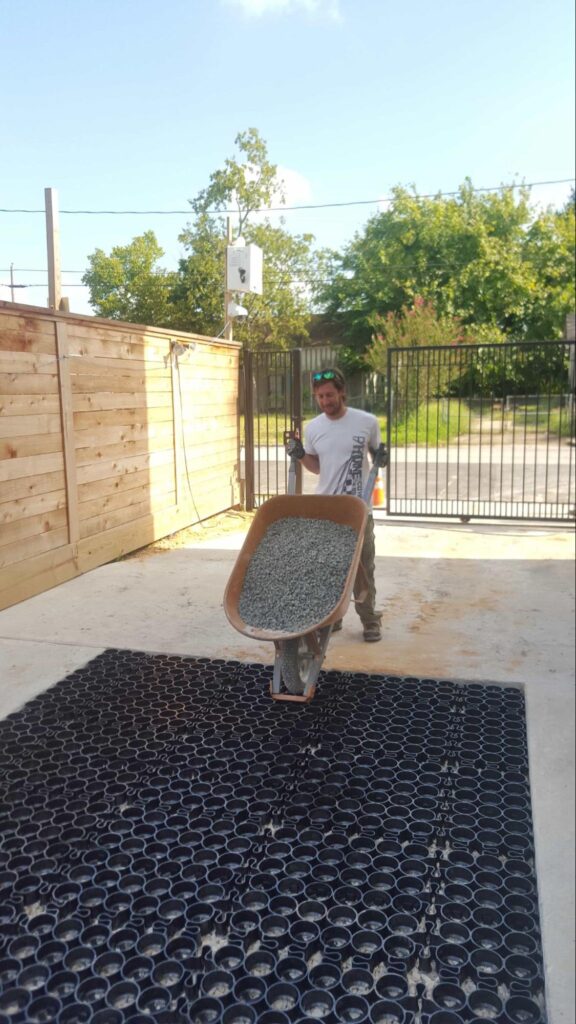If you’re considering a new driveway or parking lot for your home or business, you want to select a material that will provide durability, beauty, and be environmentally-friendly. To do this, you may want to start by identifying concrete vs. asphalt driveway differences.

There’s an ongoing debate between concrete and asphalt driveways, with each having their unique strengths and drawbacks. In this article, we’ll consider the pros and cons of both concrete and asphalt, and introduce you to an innovative paving solution – TRUEGRID® Permeable Pavers. TRUEGRID® combines the best features of concrete and asphalt, while minimizing their environmental impact.
Understanding the Basics: Concrete vs. Asphalt
Concrete Driveways

Concrete driveways are an excellent choice for homeowners seeking a strong and reliable driveway that stands the test of time.
- Can handle various weather conditions for long-lasting durability
- Remains firm in hot weather and resists common issues like potholes and cracks
- A practical and reliable solution for your driveway needs
- Requires less upkeep and maintenance
- Can be stained, polished, or textured to create a variety of visual effects
These attributes make concrete a suitable choice for homeowners looking for a one-time, long-term investment that combines both durability and design.
Asphalt Driveways

Asphalt driveways, on the other hand, are known for their cost-effectiveness and quick installation process.
- Can be driven on just days after installation
- Particularly popular in colder climates due to their ability to endure harsh winter conditions
- Dark color helps melt snow faster, a key advantage for those in snowy regions
- Requires more frequent maintenance, including sealing every few years to prevent cracks and extend its lifespan
- Cost of upkeep is generally lower than that of concrete
From a design standpoint, asphalt is less versatile than concrete. It generally comes in one color – black. Its smooth, clean, and classic look can nicely complement the overall aesthetic of many homes.
Although concrete and asphalt both have their merits, there’s a third option that you should consider: TRUEGRID®. TRUEGRID® Permeable Pavers provide the durability of concrete, the cost-effectiveness of asphalt, and superior longevity. Plus, they’re eco-friendly and highly customizable, which makes them a versatile choice for any driveway project.
Aesthetic and Design Flexibility
Personalizing with Concrete
Concrete driveways allow for a high degree of personalization. Unlike asphalt, concrete can be readily stained or dyed to almost any color you want for tremendous flexibility in matching your driveway with the color scheme of your home or landscape.
Additionally, concrete can be stamped or engraved with various patterns and textures to mimic the appearance of brick, cobblestone, or other natural stones, to give your driveway a unique and high-end look.
Concrete driveways are not limited to flat slab finishes and slate gray colors. Various other finishes, such as brushed or exposed aggregate, can be utilized.
Simplicity of Asphalt
Asphalt driveways, despite their lack of color options, offer a simple, yet classic elegance. The sleek, black surface delivers a clean and seamless look, for a uniform aesthetic that can match any architectural style. Whether your home is a quaint, vintage cottage or a modern, minimalist residence, an asphalt driveway can complement it perfectly.
The third option combines the best of both worlds: TRUEGRID®. With TRUEGRID®’s permeable pavers, you can enjoy the durability of concrete, the affordability of asphalt, and exceptional longevity. Plus, they’re eco-friendly and highly customizable.
Environmental Impact and Sustainability
Concrete Considerations
Concrete, while durable and aesthetically versatile, carries a significant environmental footprint.
- The production process is characterized by high energy consumption and significant CO2 emissions.
- Once installed, concrete surfaces do not allow water to seep into the ground. This can lead to stormwater runoff that can potentially contribute to local flooding and water pollution.
- Moreover, concrete driveways, being non-porous, can contribute to the ‘urban heat island’ effect by absorbing heat during the day and releasing it at night, thereby increasing local temperatures.
The environmental considerations of concrete are significant, but it’s worth noting that innovations like TRUEGRID®’s permeable pavers are a more sustainable alternative. TRUEGRID® pavers allow water to seep through, to reduce runoff, and they’re made from 100% recycled materials to further minimize their environmental impact.
Asphalt and Recycling
Unlike concrete, asphalt can be recycled.
- Old asphalt can be reclaimed and reused in new pavement projects, which significantly reduces the need for new materials. This conserves natural resources and reduces waste generated by road construction and repair.
- Asphalt can absorb and retain heat which can be advantageous in colder climates as it helps to quickly melt snow and ice, which reduces the need for salt or chemical de-icers that can be harmful to the environment.
- Asphalt driveways are non-permeable and can contribute to stormwater runoff that can lead to potential flooding and water pollution.
- Like concrete, asphalt also contributes to the ‘urban heat island’ effect.
A permeable solution like TRUEGRID® pavers can mitigate these issues. TRUEGRID® pavers are made from 100% recycled materials and allow water to seep through, for a sustainable and robust choice for your driveway needs.
Concrete and Asphalt Driveway vs. TRUEGRID® – Making the Decision

When it comes to choosing between concrete, asphalt, or TRUEGRID® for your driveway, the decision involves considering a variety of factors such as cost, durability, aesthetics, and environmental impact.

As reflected in the chart above, TRUEGRID® stands out as a superior choice. It offers high durability and aesthetic flexibility, similar to concrete, while also being recyclable like asphalt. Unlike both concrete and asphalt, TRUEGRID® products have low environmental impact due to their permeability and low heat absorption.
TRUEGRID® has the added benefit of simple installation. Without the need for industry-only or highly specialized equipment required for concrete or asphalt, a motivated DIYer can install TRUEGRID® themselves. TRUEGRID® can use readily available rental equipment from home stores and rental shops.

Furthermore, they are made from 100% recyclable materials, showcasing the TRUEGRID® commitment to sustainable solutions. With TRUEGRID®, not only will you have a sturdy and visually appealing driveway, you’ll also contribute to the preservation of our environment.
Discover TRUEGRID®: A Smarter Alternative to Traditional Concrete and Asphalt Driveways
Now that you understand the differences between concrete vs. asphalt driveway applications, are you ready to redefine your outdoor space while making an eco-friendly choice?
Choose TRUEGRID® permeable pavers for your driveway needs. Our PRO PLUS® Pavers combine the perfect blend of aesthetics, durability, and sustainability that stands the test of time. Say goodbye to stormwater runoff and urban heat islands and enjoy a solution that values both your needs and the environment.
Contact us today for more information and a free estimate!



